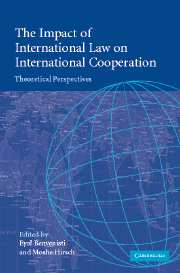Book contents
- Frontmatter
- Contents
- List of contributors
- Acknowledgments
- List of abbreviations
- 1 Introduction
- 2 International law and international relations theory: a prospectus
- 3 Pathways to international cooperation
- 4 Customary international law as a judicial tool for promoting efficiency
- 5 Reputation, compliance and development
- 6 Rethinking compliance with international law
- 7 Compliance with international norms in the age of globalization: two theoretical perspectives
- 8 Compliance and non-compliance with international norms in territorial disputes: the Latin American record of arbitrations
- 9 International trade and domestic politics: the domestic sources of international trade agreements and institutions
- 10 Human rights, developing countries and the WTO constraint: the very thing that makes you rich makes me poor?
- 11 Back to court after Shrimp–Turtle: India's challenge to labor and environmental linkages in the EC generalized system of preferences
- Index
3 - Pathways to international cooperation
Published online by Cambridge University Press: 06 July 2009
- Frontmatter
- Contents
- List of contributors
- Acknowledgments
- List of abbreviations
- 1 Introduction
- 2 International law and international relations theory: a prospectus
- 3 Pathways to international cooperation
- 4 Customary international law as a judicial tool for promoting efficiency
- 5 Reputation, compliance and development
- 6 Rethinking compliance with international law
- 7 Compliance with international norms in the age of globalization: two theoretical perspectives
- 8 Compliance and non-compliance with international norms in territorial disputes: the Latin American record of arbitrations
- 9 International trade and domestic politics: the domestic sources of international trade agreements and institutions
- 10 Human rights, developing countries and the WTO constraint: the very thing that makes you rich makes me poor?
- 11 Back to court after Shrimp–Turtle: India's challenge to labor and environmental linkages in the EC generalized system of preferences
- Index
Summary
How do states and other international actors move from one level or type of cooperation (which might be the absence of cooperation) to stronger levels or types? While international cooperation sometimes occurs in “big bangs,” in which states jump suddenly from low to high levels of cooperation on an issue, cooperation typically advances incrementally through one, or sometimes several, way stations, such as non-binding declarations, vague undertakings and narrowly plurilateral agreements. These incremental processes can be understood in terms of movement along three important dimensions of cooperation: substantive content, participation and – of special importance for this volume – legalization. In this chapter we identify three alternative routes to cooperation – “pathways” – that correspond to these three dimensions and examine the circumstances under which particular strategies of gradual cooperation will be more effective and are therefore more likely to be chosen as pathways to cooperation.
Our general argument is that states often cannot move directly to a cooperative solution because of informational, bargaining and distribution problems that hamper collective action. We begin with one such problem: the uncertainties that actors commonly face regarding the nature of particular issues, the nature and capabilities of potential cooperators, and political reactions at home and abroad. The three stylized gradual processes we identify here have as their key features that they (i) allow states to limit their commitments at any point in time to the level of cooperation they find appropriate given their uncertainty, and (ii) provide states with opportunities to resolve these uncertainties and undertake greater (joint) cooperative commitments as they are ready to do so. Each pathway offers advantages for dealing with particular types of uncertainty.
- Type
- Chapter
- Information
- The Impact of International Law on International CooperationTheoretical Perspectives, pp. 50 - 84Publisher: Cambridge University PressPrint publication year: 2004
- 22
- Cited by



